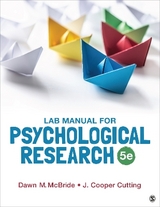
Lab Manual for Psychological Research
SAGE Publications Inc (Verlag)
978-1-5443-2356-5 (ISBN)
The Lab Manual for Psychological Research, Fourth Edition provides students with opportunities to practice and apply the knowledge and skills learned in their research methods course. Developed for use in a lab course or as take-home review, the manual contains four types of practice: exercises that connect to specific concepts; exercises for developing a research project; APA-style exercises that become progressively more complex; and instruction for how to avoid plagiarism. This comprehensive and practical manual can be used with Dawn M. McBride′s best-selling The Process of Research in Psychology, Fourth Edition or as a supplement to other core texts.
Dawn M. McBride is professor of psychology at Illinois State University, where she has taught research methods since 1998. Her research interests include automatic forms of memory, false memory, prospective memory, task order choices, and forgetting. In addition to research methods, she teaches courses in introductory psychology, cognition and learning, and human memory; she also teaches a graduate course in experimental design. She is a recipient of the Illinois State University Teaching Initiative Award and the Illinois State University SPA/Psi Chi Jim Johnson Award for commitment to undergraduate mentorship, involvement, and achievement. Her nonacademic interests include spending time with her family, traveling, watching Philadelphia sports teams (it was a good year for Philly sports this year!), and reading British murder mysteries. She earned her PhD in cognitive psychology from the University of California, Irvine, and her BA from the University of California, Los Angeles. J. Cooper Cutting (PhD, cognitive psychology, University of Illinois at Urbana-Champaign) is associate professor of psychology at Illinois State University. Dr. Cutting’s research interests are in psycholinguistics, primarily, with a focus on the production of language. A central theme of his research is how different types of information interact during language use. He has examined this issue in the context of lexical access, within-sentence agreement processes, figurative language production, and pragmatics. He has taught courses in research methods, statistics, cognitive psychology, computer applications in psychology, human memory, psycholinguistics, and sensation and perception. He is also a recipient of the Illinois State University SPA/Psi Chi Jim Johnson Award for commitment to undergraduate mentorship, involvement, and achievement. His non-academic interests include gardening and reading science fiction and fantasy novels.
Introduction for Instructors
Table of Contents: Connections to Text Chapters
Acknowledgments
Part I. Research Methods Exercises
1. What Do We Know and How Do We Know It?
2. Science Versus Pseudoscience Exercise
3. Design a Study Exercise
4. Naturalistic Observation Exercise
5. Survey Research Exercise
6. Science in the News
7. How to Read Empirical Journal Articles
8. Reading Journal Articles: Assefi and Garry (2003)
9. Reading Journal Articles: Mueller and Oppenheimer (2014)
10. Reading Journal Articles: Lee et al. (2014)
11. Reading Journal Articles: Roediger and Karpicke (2006)
12. Reviewing the Literature
13. Learning Check: Basics of Psychological Research
14. Research Design Exercise
15. Design and Data Collection Exercise
16. Identifying and Developing Hypotheses About Variables
17. Experiments Exercise
18. Independent and Dependent Variables Exercise
19. Identifying Variables From Abstracts
20. Identifying Variables From Empirical Articles
21. Internal and External Validity Exercise
22. Learning Check: Experimental Designs
23. Ethics Exercise
24. Ethics in a Published Study Exercise
25. Sample Consent Form
26. Learning Check: Ethics
27. Subject Sampling Exercise
28. Descriptive Statistics Exercise
29. Making and Interpreting Graphs
30. Misleading Graphs Exercise
31. Correlations and Scatterplots Exercise
32. Inferential Statistics Exercise
33. Inferential Statistics and Analysis Exercise
34. Hypothesis Generation Exercise
35. Statistics With Excel Exercise
36. Learning Check: Statistics
37. Bias and Control Exercise
38. Factorial Designs Exercise
39. Factorial Design: Sproesser, Schupp, and Renner (2014)
40. Factorial Design: Farmer, McKay, and Tsakiris (2014)
41. Describing Main Effects and Interactions Exercise
42. Specialized Designs Exercise: Developmental
43. Learning Check: Bias and Control and Specialized Designs
Part II. Research Project Exercises
44. Getting Your Research Ideas for the Group Project
45. Picking Your Research Idea for the Group Project
46. Brief Literature Review for Group Project Development
47. Variables in Your Group Projects
48. Mock Institutional Review Board Form
49. Pilot of Research Project
50. Statistical Analyses for Your Group Project
51. Group Project Literature Review
52. Group Project Methods Section
53. Group Project Results Section
54. Group Project Discussion Section
55. Group Project Abstract
56. Poster Presentation Checklist
57. Oral Presentation Checklist
58. Group Project Progress Report
59. Group Project Data Analysis Exercise
Part III. APA-Style Exercises
60. Sample APA Paper
61. Creating References
62. APA-Style Quiz
63. APA-Style Exercise
64. Sample Manuscript Text
65. Using Citations and Creating References
66. APA Exercise: Organizing and Formatting a Complete Report—Part A
67. APA Exercise: Organizing and Formatting a Complete Report—Part B
68. APA Exercise: Organizing and Formatting a Complete Report—Part C
69. APA Exercise: Organizing and Formatting a Complete Report—Part D
70. APA-Style Manuscript Checklist
Part IV. Avoiding Plagiarism Exercises
71. Academic Honesty Guidelines: What Is (and Isn’t) Plagiarism
72. Examples of Plagiarism
73. Identifying and Avoiding Plagiarism
References
Index of Concepts and Terms
| Erscheinungsdatum | 08.02.2019 |
|---|---|
| Verlagsort | Thousand Oaks |
| Sprache | englisch |
| Maße | 215 x 279 mm |
| Gewicht | 440 g |
| Themenwelt | Geisteswissenschaften ► Psychologie ► Allgemeines / Lexika |
| Sozialwissenschaften ► Soziologie | |
| ISBN-10 | 1-5443-2356-5 / 1544323565 |
| ISBN-13 | 978-1-5443-2356-5 / 9781544323565 |
| Zustand | Neuware |
| Haben Sie eine Frage zum Produkt? |
aus dem Bereich



